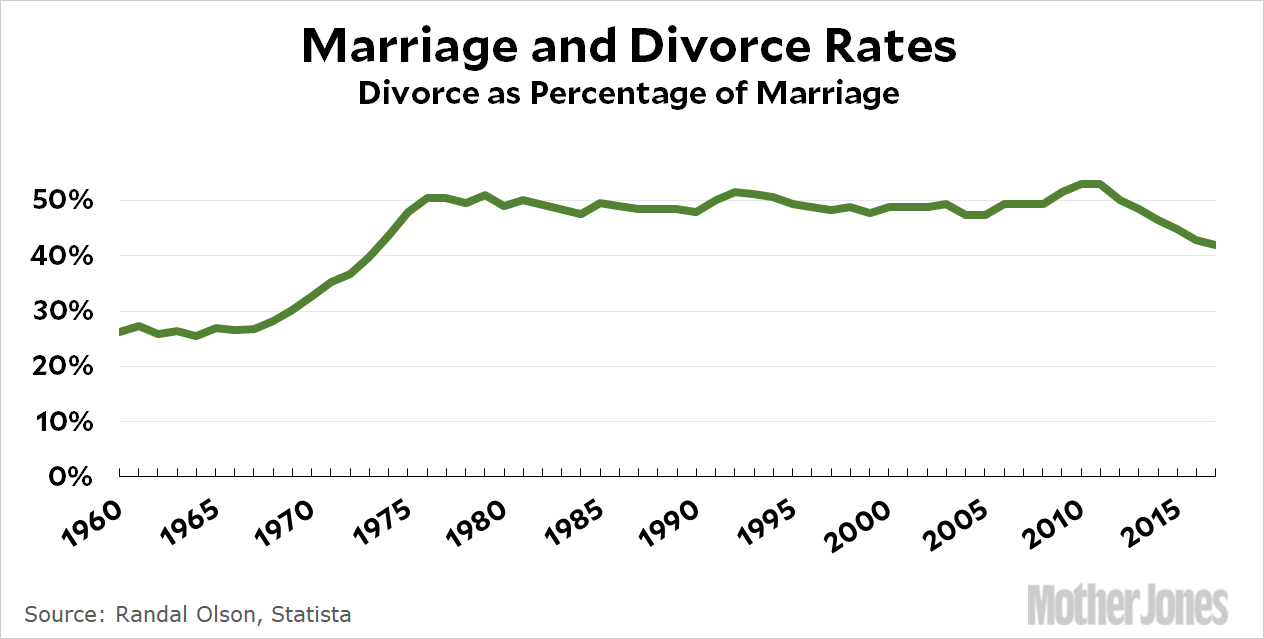The latest American Family Survey sponsored by the Deseret News is out, and naturally I want to comment on something that’s not really the subject of the survey at all. Among other things, they ask people about trends in family life:
Does the American public have an accurate view?…The percentages are striking. Almost nine in ten people believe that the divorce rate is getting worse when it is not.
Well, yes, although the percentage is a little less striking when you take a look at divorce as a percentage of marriages:

I’m not arguing that this is the one and only right way to measure divorce—that depends on what precisely you’re interested in—just that it’s probably the way people think about divorce when they aren’t thinking too hard. And what you see is a big increase in the ’60s, a long stretch of flatness, and then a modest decline starting with the Great Recession.
So my question is this: how long does it normally take the public to realize that a long-term trend has turned around? The AFS finds that 88 percent of Americans think the divorce rate is increasing, even though (a) it hasn’t really increased since 1975 and (b) it’s been decreasing for the past ten years.
Now, one obvious thing to say about this is that most Americans don’t know very much about anything. And why should they? Most people simply don’t have the time or interest to follow the latest figures on hundreds of different trends. Is the inflation rate high or low? Are math skills among high school students up or down? What’s the trade deficit with China? Who knows? Who cares?
So when it comes to social trends, here’s my take: We are all still stuck in the ’60s and early ’70s. Yes, even you Gen Xers and Millennials to some extent. Changes in the ’60s—drugs, crime, sex, divorce, etc.—got a huge amount of attention and it takes an equal amount of attention to convince people that those things have turned around. Violent crime has been dropping for 30 years, but people still think crime is on the rise. Inflation has been well under control since the Reagan era, but people still worry about it. The growth of health care costs has softened enormously since 2000, but people still think that medical inflation is ruinous.
There are reasons for this, some good and some bad:
- No serious researcher wants to declare that a trend has turned around until there’s good evidence for it. For social indicators that vary a lot from year to year, that means at least ten years of consistent evidence, and probably more like twenty.
- In many cases, we still use the ’60s as a baseline. Violent crime may be down a lot, but it’s still higher than it was in 1959. Ditto for divorce and teen pregnancy and so forth.
- Lots of people have ideological reasons for pushing doom narratives. If unleaded gasoline was the main cause of the crime spike of the ’60s and ’70s, then you can no longer blame the liberal elites and their embrace of the counterculture. If medical costs aren’t skyrocketing anymore, it hurts the arguments for universal health care.
- The news media is addicted to bad news. A spike in gasoline prices generates hysterical news coverage, but when prices go down they produce little except for the occasional “good time to go on vacation!” feel-good story.
- People generally respond to bad news more strongly than good news. A cut in your insurance coverage can be life-threatening. An increase in benefits is often barely noticeable.
- Good news is often invisible. If no one has been mugged in your neighborhood in the past year, would you even know it?
There are other reasons, but I think these are the big ones. And they all contribute to both a lot of inertia in public attitudes as well as a strong bias towards bleak narratives.
But the truth is quite different: Just about every social indicator you can think of has been moving in a good direction for the past couple of decades. Kids are better behaved. Crime is down. More people have access to health care. Divorce is down. Most indicators of racism are down. Income has risen considerably since the end of the Great Recession and is now significantly higher than it was when Bill Clinton took office. Etc.
So why are so many of us apparently convinced that America is going to hell in a handbasket? Well, there are some scary things going on. Climate change is real. Opioid abuse is up. Health care inflation may be down, but costs are still going up and things like surprise out-of-network billing are real problems.
And then there’s the big one: wages of working-class and middle-class men are way down over the past four decades. It’s quite possible that this is so overwhelming for a large segment of the population that it colors literally everything else.
Nickel summary: Things are generally pretty good in America! Not everything, but most things. We sure don’t act like it, though.
Am I missing anything important here?


















